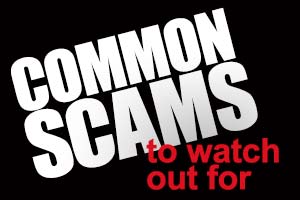
After disasters, it’s important to keep an eye out for these common scams:
Home Repair Scams
A common home repair scam involves a person showing up at your property and offering to do repair work. The person will ask for funds up front, and once you have paid, he or she never returns. Never pay more than half the cost of repairs in advance and
always ask for a detailed estimate in writing.
Before hiring someone, check their references, insurance, and licenses. It’s also a good idea to ask your neighbors and friends who they have used locally to complete their repairs.
Other Scams
Scammers may also pose as utility workers, insurance adjusters, and FEMA officials. Always verify the identity of anyone who contacts you by calling the utility company, insurance company, or FEMA directly. Also beware of anyone who asks for your 9-digit
FEMA registration number or banking information. Legitimate FEMA officials never ask for this information.
Donation Scams
We all want to help after a disaster, but it’s important to check out any charity you’re thinking of donating to ahead of time. You can use websites like
Charity Navigator,
Charity Watch, and
Guidestar to make sure any non-profit is legitimate before making a donation.
Keep an eye out for unsolicited donation requests that may come to you by email or social media. Don’t click on links in emails or on Facebook or Twitter; they could be links to malicious websites.
When using a search to find charities, be careful with the search results. Carefully read the Internet addresses before you click. Scammers often create fake websites with web addresses that are very close to legitimate charity URLs. Look for slight misspellings,
tweaks, or sound-alike names. Know that most legitimate non-profit organizations web addresses also typically end in .org.